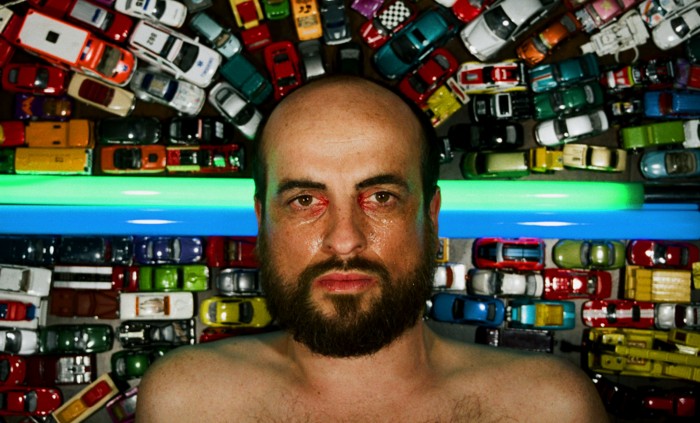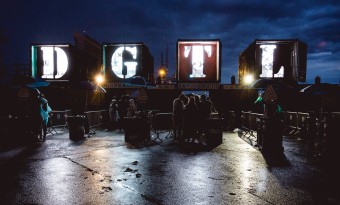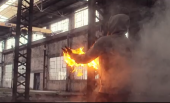It’s about kick drums.
Matthew Herbert clearly has some affection for contextualisation. His music is generally quite easy to talk about because you’ve generally got liner notes explaining some set of rules, remit, or sample reference to fall back on. Explaining the context is possible, and for a geek like me, it’s enough to add a layer of excitement.
This show is no different. There’s a lot of care put into set and setting. But the key message I take from the introductory section of the performance is that it’s about kick drums.
It’s not the only thing going on, not by a long way.
We open up with a reading. The late David Foster Wallace’s commencement address ‘This is Water’. It’s an odd scene setter, but it’s largely arresting. There’s an irony present when a speech about avoiding selfishness gets heckled for taking too long, and an even greater one when the heckling gets shushed, but it’s hard to avoid the power of the sentiment. It’s also a very odd way to set up a club night, but this is the Queen Elizabeth Hall, not a night club, which is almost a shame, as what follows is going to be pretty close to my perfect disco.
Anyway, as the coda of the ‘This is Water’ speech, a reminder to stay awake and not slip into a default mode of entitlement, repeats, the opening notes of Herbert’s latest album The Shakes comes in, and the band appears.
Well, actually, the stage is held in darkness as the music appears, waking from the darkness, lights flicking on as different band members remember that they need to see their hymn sheets. ‘Battle’ is a brooding number, but sets the right segue out of Wallace’s intense introspection and hopeless hope into the bulk of the evening. The performance is blissful. A small brass section, the vocal duo of Ade Omotayo and Rahel Debebe-Dessalegne, keys, guitar, the man himself and a second knob twiddler. All pouring their hearts into the room.
There is a sense of occasion. It’s a good start.
Once it’s over, Herbert steps forward towards a mike for a bit more scene setting, and it’s an utterly arresting moment. His engineer partner (who actually seems to do most of the digital labour during the show, with Matthew spending more time dancing, keyboarding, and mingling) is ready to trigger samples, as Herbert tells us what we will and won’t be hearing through the night.
This is what sets up the night as being the Herbert gig I’ve been waiting for since I first bumped into his music. One key element is simply that this is the first time I’ve seen him perform as ‘Herbert’, rather than one of his multitude of guises and side projects (or even under his own name). Herbert is house. Utterly distinct house. I feel like I’m in for a treat.
But Matthew Herbert’s work has an underlying thread beyond that, and that’s the use and explanation of samples. It’s impossible to talk about Herbert without talking about his wide and varied and highly particular sound sources. This is the man who tried to get a sample of the Queen saying ‘Yes’ by writing a letter. He didn’t, but somehow has a sample of Prince William cleaning a toilet. This is the man who broke my heart and tried to sonify the destruction of war using the sound of his prematurely born child’s life support. This is the man who has made entire tracks from a Big Mac meal and entire albums from bombs and pigs.
So it makes sense to introduce us to the night through samples, and he does. He tells us which tracks we will hear, with tiny bursts from some of his absolute classics, but also tells us what we can’t hear, little bursts of Radio Boy and big band numbers, because they don’t have a big enough band, and David Byrne (who commissioned the show as part of his Meltdown festival) said ‘no techno’.
Then some specifics. The royal toilet clean already mentioned. The sound of the audience of his last show in Japan (he then quickly records us, for his next show). The sound of his child being born. He tells us he had his teeth out earlier this year, and that we might hear that sound, an ear wrenching crack bursts through the speakers, and the audience visible flinches… he insists on playing it again.
And then the kick drum. It’s a fine conceit, but he explains that they have 9,478 kickdrums to use tonight. The only rule is they won’t stop. (This doesn’t quite turn out true, but I get where it’s coming from, and it does prepare us for the sense of momentum the night will have). The kick drum starts, and he reminds us of all the things a kickdrum can be and takes us on a brief tour through some of them (using the monarch to be’s toilet brush as an occasional fill). He sets up the own-brand fruit bottle, and launches into the music.
And it just doesn’t stop. For the next hour or more we are left enthralled by an ever shifting pallet of kickdrums. With everything else wrapped around that house backbone.
It’s glorious.
And the truth is, that it is the kick drums that have always made Herbert’s work so distintive. Well. Not just the kick drums, but the sound of the percussion. It’s easy (and fun) to get caught up in the excitement of the sound sources, but it ignores the other crucial element, the sound itself.
Herbert’s drums are so rarely drums, but an ever shifting constellation of unusual crunchy thudding messes. It’s delightful. The new record is a testament to this, getting away from the immaculate loungeness of the last formal Herbert record (Scale) and resting on a rawer spine of crunching beats, irresistible synthesisers, moving pads, sharp horns and heartfelt vocal lines. It feels a bit more thrown together, but in a great way.
And live, that rawness becomes more so. To be honest, it quite often sounds a bit messy. Herbert’s famed commitment to the accidental means that samples clip, effects get muddy and imperfections are definitely present. The beauty of the show is just how satisfying it is. The core of the music is gripping, and the emotional shifts of each piece only grab you harder, squeeze you tighter, pull you further up.
The night goes on, bouncing, without rest, between songs from the new album and songs from timeless classic Bodily Functions. It’s exactly what I’ve always wanted. Effectively Herbert DJing his best work with a live band, and all the changes in texture and energy that implies. One of the only breaks in the sound is just to take samples from the audience, an enormous, telescopic microphone on a pole, suspended precariously over us as we well, clap and shush, the sounds instantly woven into the fierce revolutionary sentiment of ‘Strong’. Audience participation that actually changes the song.
It’s probably gimmicky, but it’s also a chance to demonstrate that there is a liveness to the electronic elements here. Herbert’s apprentice (that probably sounds patronising actually, but I didn’t catch his name and I’m quite upset, as he was pretty on the ball) is hard at work on a combination of electronic apparatus, and I think Herbert always wants a way to expose the fact that they aren’t just pressing play. There is hard work going into making sure this work is at least partly created on the fly, despite the obvious structure and planning. (All the players have sheet music, for example… this is performance, not improvisation… as dictated by those 9,478 kickdrums.)
And it’s a delight. Barnstormer ‘Leave Me Now’ becomes messier and squelchier in this context. Key motifs of the studio version rinsed off and replaced. It’s fine, it’s still a gorgeous piece of work.
He does have a cliche. Most of the tracks have a moment of opening out. Not exactly a drop, but a halfway point, where some extra element is added, feeling like it was there from the beginning, and upping the emotional ante. A sudden shift in tone, that pulls the song open and outward. Occasionally he uses this as an excuse to kick into an entirely different song, and if you know the tracks, it’s a pretty sublime experience. Hell, even if you don’t, it’s got to get you.
Never is this opening out felt more than on main set closer ‘The Audience’, where the critical appearance of a contrasting, slowly warming piano grabs a chunk of the audience and pulls them dancing to the front. It’s beautifully intense. As a long-time fan, I’m overwhelmed. This is literally a musical moment I’ve dreamed about, Ade and Rahel managing to imitate or replace Dani Siciliano’s outrageously sassy performance, the music just filling the space and reaching out and grabbing everyone. Even as they tell us that the music won’t last, it pulls you deeper into it. It’s a gorgeous moment, though I obviously lack objectivity here. As that song plays, my heart bursts, and I feel like I’m taken to the top of the world. It’s perfect. And it’s heartbreaking when the promised end arrives.
I’ve skipped so much, and already written way too much. I missed the unsettling act of a song called ‘Safety’ performed by a band in the black hoods of Guantamo. I’ve missed the way Smart makes some of Herbert’s most detuned twenty pianos segue from off kilter riff into a blissful, raunchy, floor stomper. The use of the piano solo in ‘Suddenly’ to take the tempo down from some heartbreak.
The energy and delight of the whole show. I can’t contain it. I couldn’t contain it. I certainly can’t explain it.
The inevitable encore is the inevitable album closer of The Shakes. ‘Peak’ is true to its word. It can’t quite approach ‘The Audience’, and it feels at first like it won’t even get close. But this is a song that pulls off the pretty cheap trick of lasting fifteen minutes and aiming to sound like it’s always getting higher and louder whilst talking about mountains.
It works. The sound fills the space. The beat pounds. The audience is now all standing, and mostly dancing. I am looking hot as hell. My arms are rising with the beats. I feel like a Supreme. It’s blissful, it’s powerful, and it’s the sound of people coming together and feeling good.
This is water. I know. This is selfish escapism. But it’s also something that you need every now and then, a reminder that there is sublime in the world. If David Foster Wallace can find a supermarket sacred, then I can sure as hell find solace in a throbbing beat, a church organ and a room of people dancing together and feeling connected.
Herbert’s always spoken of a tension between the political content of his songs and the escapism of club culture. Unfortunately I’m terrible at listening to lyrics, so for the performance, I’m on the wrong side of the divide, but the feeling of wholeness music can give you remains a powerful tool for bringing people together.
The band leaves the stage, the music carries on thudding for a minute. The crowd roars with applause for the hundredth time that night. The song ends and I hug a dear friend.
This is water.
This is water.
This is water.
This is Herbert.
Alex Allsworth






Follow us
Follow us on Facebook Follow us on Twitter Follow us on Google+ Subscribe our newsletter Add us to your feeds